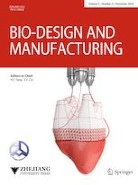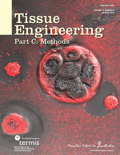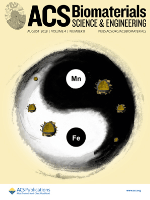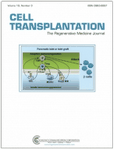
Tissue Engineering Part B-Reviews
metrics 2024
Navigating the Future of Regenerative Medicine Research.
Introduction
Tissue Engineering Part B-Reviews is a premier academic journal published by MARY ANN LIEBERT, INC, focusing on the interdisciplinary field of tissue engineering and regenerative medicine. With an impressive impact factor that places it in the Q1 category across multiple relevant fields—including Biochemistry, Bioengineering, Biomaterials, and Biomedical Engineering—this journal provides a vital platform for researchers and professionals to disseminate cutting-edge findings and comprehensive reviews. Covering a vast scope from 2008 to 2024, the journal is committed to advancing knowledge in the application of engineering principles to biological tissues, making it an indispensable resource for those at the forefront of biomedical innovation. While the journal does not currently offer open access options, its rigorous peer review process ensures high-quality contributions that are essential for academic and practical advancements. The journal's rankings in Scopus reflect its significance, catering to a diverse audience of students, researchers, and practitioners seeking the latest insights in this dynamic field.
Metrics 2024
 1.37
1.37 5.10
5.10 8.90
8.90 114
114Metrics History
Rank 2024
Scopus
IF (Web Of Science)
JCI (Web Of Science)
Quartile History
Similar Journals

Bio-Design and Manufacturing
Leading the Charge in Sustainable Bio-ManufacturingBio-Design and Manufacturing, published by SPRINGER HEIDELBERG, is a pioneering journal that stands at the forefront of innovation in the fields of Biomedical Engineering, Biotechnology, Industrial and Manufacturing Engineering, and Materials Science. With its ISSN 2096-5524 and E-ISSN 2522-8552, this journal has established itself as a leading platform for disseminating cutting-edge research and advancements that merge biological principles with manufacturing processes, emphasizing sustainable and efficient practices. It has garnered recognition in the 2023 category quartiles, boasting a Q1 rank in all its relevant fields, which underscores its significance and impact—evident from its prime Scopus rankings that place it within the top percentiles of numerous engineering and materials science disciplines. Researchers, professionals, and students alike benefit from the wealth of knowledge presented in this journal, making it an essential resource for those seeking to enhance their understanding of bio-design applications and innovation in manufacturing processes.

Biomaterials Research
Advancing biomaterials for a healthier tomorrow.Biomaterials Research, published by the American Association for the Advancement of Science, is a prominent open access journal established in 2014, dedicated to advancing the field of biomaterials. Based in the United Kingdom, this journal has swiftly become an essential platform for researchers and practitioners, offering groundbreaking insights in biomaterials, biomedical engineering, ceramics and composites, and miscellaneous medical fields. With its impressive Q1 ranking across multiple relevant categories in 2023 and its strong Scopus rankings, including a remarkable 90th percentile in the medicine category, Biomaterials Research showcases high-quality, peer-reviewed research designed to address both practical and theoretical challenges in biomaterials science. As an open access journal, it promotes wider dissemination and accessibility of research findings, crucial for fostering innovation and collaboration within the scientific community. Researchers, professionals, and students alike are encouraged to contribute, read, and engage with the latest developments in this dynamic field.

Asian Journal of Pharmaceutical Sciences
Empowering discoveries in the realm of pharmaceutical sciences.Asian Journal of Pharmaceutical Sciences is a prestigious open-access journal published by Shenyang Pharmaceutical University, dedicated to advancing research and developments in the field of pharmaceutical sciences. Since its inception in 2009, the journal has successfully converged a wealth of knowledge and innovation, demonstrating an impressive track record with its open access model adopted in 2013, ensuring global dissemination of crucial research findings. With an outstanding impact factor and consistently ranked in the Q1 category for both Pharmaceutical Science and Pharmacology in 2023, it ranks among the top journals in its field, as evidenced by its impressive Scopus rankings—4th out of 183 in Pharmaceutical Science and 10th out of 313 in Pharmacology, showcasing its high relevance and credibility (98th and 96th percentiles respectively). Researchers, professionals, and students can access a diverse array of articles that encompass groundbreaking studies, reviews, and reports, solidifying the journal's position as a vital resource for anyone engaged in pharmaceutical research. With its commitment to quality and accessibility, Asian Journal of Pharmaceutical Sciences plays an essential role in fostering innovation and collaboration within the global scientific community.

Tissue Engineering and Regenerative Medicine
Elevating the Science of Tissue Engineering and RegenerationTissue Engineering and Regenerative Medicine, published by the Korean Tissue Engineering Regenerative Medicine Society, is a distinguished journal focusing on the interdisciplinary fields of tissue engineering, regenerative medicine, and related biomedical innovations. With an ISSN of 1738-2696 and an E-ISSN of 2212-5469, this journal disseminates cutting-edge research and advancements pivotal to developing therapeutic strategies that improve tissue function and repair. As a testament to its scholarly impact, it holds a Q2 ranking in both Biomedical Engineering and Medicine (miscellaneous) categories, reflecting its influence and relevance within the scientific community, particularly with a Scopus rank placing it in the 82nd percentile among similar journals. Although the journal does not offer open access, it provides vital insights and knowledge to researchers, professionals, and students involved in the quest for innovative solutions in medical science and engineering. With its convergence years extending from 2008 to 2024, the journal continues to be an essential platform for the dissemination of high-quality research that drives the field forward.

Tissue Engineering Part C-Methods
Elevating the Science of Tissue Engineering with Rigorous ResearchTissue Engineering Part C: Methods is a prestigious academic journal published by MARY ANN LIEBERT, INC, specializing in the dynamic and rapidly evolving fields of bioengineering and biomedical engineering. With an ISSN of 1937-3384 and E-ISSN 1937-3392, this journal provides a platform for the dissemination of cutting-edge research from 2008 to 2024, showcasing methodologies that advance the science of tissue engineering. Ranked in the second and third quartiles across several categories in 2023, including a notable Q2 in Biomedical Engineering, the journal is recognized for its contributions to the interface of biology and engineering. Additionally, it holds commendable Scopus ranks that highlight its influence and reach within the scientific community. Although it does not offer open access, the journal remains vital for researchers, professionals, and students seeking insightful articles that bridge the gap between theoretical research and practical application in tissues and regenerative medicine. With its rigorous peer-review process and commitment to quality, Tissue Engineering Part C: Methods continues to be an essential resource for those at the forefront of tissue engineering innovations.

Biofabrication
Innovating Solutions at the Intersection of Biology and Technology.Biofabrication, published by IOP Publishing Ltd, stands at the forefront of the interdisciplinary fields of biochemistry, bioengineering, biomaterials, biomedical engineering, biotechnology, and miscellaneous medicine. Since its inception in 2009, this prestigious journal has secured its position within the Q1 category across multiple disciplines as of 2023, reflecting its high impact and significant contribution to advancing research in these domains. With ranks such as #19 in biochemistry and #10 in biomaterials according to Scopus, it showcases groundbreaking studies and innovative methodologies that are crucial for the evolution of biofabrication technologies. Authored by leading researchers and professionals, the journal publishes articles that explore the synthesis, characterization, and application of biomaterials, providing valuable insights for both academic researchers and industry practitioners. The impact factor of the journal, combined with its rigorous peer-review process, guarantees high-quality content that pushes the boundaries of knowledge and technology. Researchers and students engaged in these dynamic fields will find Biofabrication an indispensable resource for staying abreast of critical developments and emerging trends.

npj Regenerative Medicine
Exploring Breakthroughs in Regenerative Science.npj Regenerative Medicine, published by NATURE PORTFOLIO, is at the forefront of research and innovation in the field of regenerative medicine, fostering a deep understanding of cellular and molecular processes that can be leveraged for therapeutic advancements. Launched as an Open Access journal since 2016, it ensures wide dissemination of knowledge, allowing researchers, professionals, and students to access high-quality articles without barriers. With an impressive impact, it holds Q1 ratings across multiple categories including Biomedical Engineering, Cell Biology, Developmental Biology, and Medicine (miscellaneous) as of 2023, indicating its critical role in shaping contemporary scientific discourse. The journal ranks notably within the top 10% in multiple Scopus categories, indicating its commitment to publishing pioneering research that addresses pressing challenges in regenerative therapies. Addressing the dynamic convergence of disciplines, npj Regenerative Medicine is poised to not only impact academic thought but also translate into clinical applications, making it a pivotal resource for those invested in the future of medicine.

ACS Biomaterials Science & Engineering
Pioneering Transformative Solutions in Biomedical EngineeringACS Biomaterials Science & Engineering, published by the American Chemical Society, serves as a premier platform for the latest advancements and research in the fields of biomaterials and biomedical engineering. With an impressive impact factor and a strong reputation reflected in its ranking—Q2 in Biomaterials and Q1 in Biomedical Engineering—the journal attracts a diverse and engaged readership. Since its inception in 2015, it has aimed to foster innovation by publishing high-quality research articles, reviews, and perspectives on the synthesis, characterization, and application of biomaterials. Researchers and professionals benefit from the journal's rigorous peer-review process and its focus on translational science, making it essential for those looking to stay at the forefront of biomaterials research. Located in Washington, DC, USA, the journal plays a pivotal role in connecting academic and industrial sectors, ultimately driving advancements that impact biomedicine and related fields.

CELL TRANSPLANTATION
Advancing the frontiers of regenerative medicine.CELL TRANSPLANTATION is a premier multidisciplinary journal dedicated to advancing the field of regenerative medicine and transplantation, published by SAGE PUBLICATIONS INC. Since its initiation in 1992 and embracing an open-access model since 2017, the journal aims to disseminate high-quality research that covers both clinical and experimental studies on cell and tissue transplantation. With a notable impact reflected in its 2023 Q2 ranking in Biomedical Engineering and significant standings in Cell Biology and Transplantation, CELL TRANSPLANTATION serves as a vital resource for researchers, practitioners, and students alike. The journal's commitment to fostering innovation is evident in its diverse contributions that address the complexities of tissue engineering, immunology, and regenerative therapies, inviting readers to engage with cutting-edge science that is poised to transform medical practices and improve patient outcomes. The journal's insightful articles and research findings make it a crucial platform for knowledge exchange within the vibrant scientific community.

Regenerative Biomaterials
Exploring New Frontiers in Regenerative MedicineRegenerative Biomaterials, published by Oxford University Press, serves as a premier platform for the dissemination of innovative research in the rapidly evolving field of biomaterials. Since its inception in 2014, this esteemed open-access journal has fostered a collaborative and diverse scientific community, providing free access to impactful articles that enhance our understanding of regenerative medicine and tissue engineering. With a commendable impact factor and ranking within the top quartiles of both Biomedical Engineering and Materials Science, it is recognized for its rigorous peer-review process and high-quality publications. The journal aims to bridge the gap between fundamental research and applied sciences, promoting advanced studies that contribute to clinical applications and regeneration strategies. Researchers, practitioners, and students alike are encouraged to engage with the journal’s content to foster interdisciplinary collaboration and drive future innovations in the biomaterials domain.